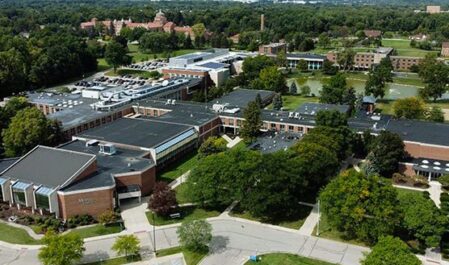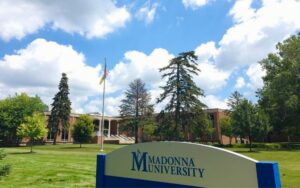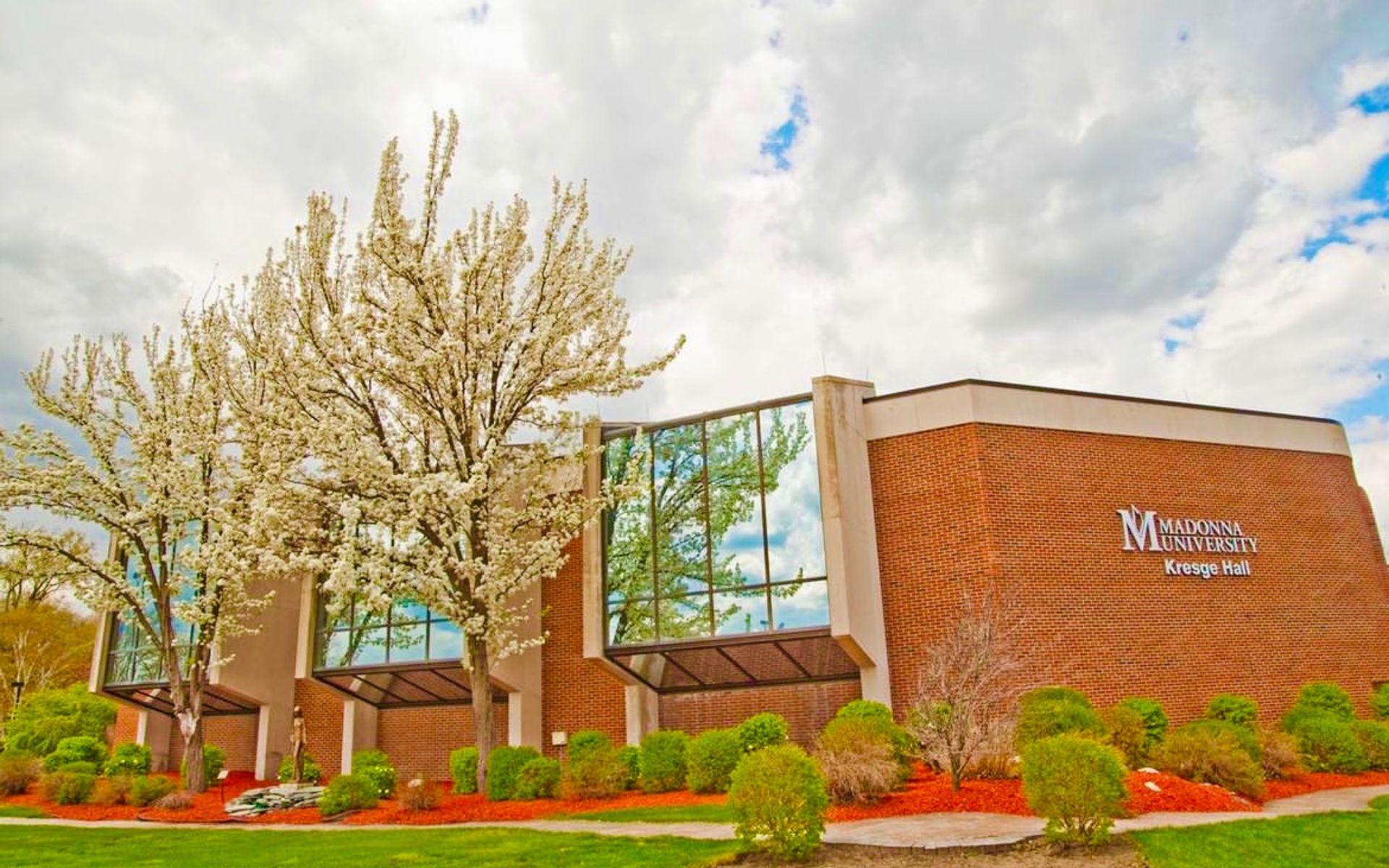




The wooded forty-nine-acre campus of Madonna University is located in Livonia, Michigan, a suburb on the western perimeter of metropolitan Detroit. The campus faces Schoolcraft Road and the Jeffries (1-96) Freeway (Exit 173 at Levan or Newburgh Road), with easy access to downtown Detroit, the Detroit Metropolitan Airport, Ann Arbor, and important state highways.
The Academic Building accommodates a variety of purposes, from administrative offices to classrooms and support services. The University remains committed to advanced technology in its delivery of instruction, increasing opportunities for learning on an “anywhere, anytime” basis. In addition to face-to-face classroom instruction, course offerings use a blend of technologies to reach students at off-campus sites, at work, or at home using Blackboard for online courses, e-mail, telecourses, audio, video, and interactive (two-way) television. Madonna’s facilities include an interactive video classroom with recording facilities, two-way live interactive television, and web conferencing capabili ties. The building also has wireless access essentially throughout.
The Ford Motor Company Technology Wing provides state-of-the-art learning resources with four computer labs, including two walk-in PC labs, a collaborative multimedia computer lab, a computer classroom, a faculty multimedia authoring lab, and a Macintosh/ PC-based multimedia lab that supports art and graphic design, video, and journalism. The IT Help Desk provides one point of contact for all technical assistance and technology workshops. The Information Technology staff maintains computer services across the campus, including the IT network, which allows remote access from offices, students’ lounges, the residence hall, and off-campus. Internet access provides immediate communication with faculty, support offices, other students, and the global community.
The University promotes the integration of learning technologies across the curriculum, from face-to-face classes enhanced with technology to courses offered entirely online. The University has outfitted most of its class rooms with state-of-the-art multimedia and computing technologies to promote advanced technology literacy in its faculty and students. The University uses Blackboard as its primary electronic learning management system and sponsors an ongoing certification program to ensure that faculty members are prepared to use the features of the systems to their full potential.
The Career Services Office assists students seeking work experience, part-time or full-time employment, on-campus student employment, and career counseling, testing, and advising. Students are alumni are invited to participate in job fairs, the resume referral service, and workshops in resume writing, job search techniques, and interviewing.
The Center for International Relations was established in 1991 as a clearinghouse for all international education programs. The focus of the Center is to promote and facilitate a wide range of study, work, and travel abroad oppor tunities for both students and faculty, as well as to assist in the recruitment of and service for students coming from abroad.
The Center for Research coordinates Human Subject reviews and provides consultation for research, data analysis, and student assessment to faculty, staff, and students.
The Franciscan Center Science and Media Building, the first LEED (Leadership in Energy and Environmental Design) certified “green” building built in Livonia, is located between the academic building and the University Center building, overlooking the St.Francis gazebo, the pond, and cardinal square. The two-story building is home to the College of Science and Mathematics and the Media Center and includes state-of-the-art instructional labs in the physi cal and biological sciences, classrooms, seminar rooms, a 150-seat lecture hall, a high-definition digital TV studio and sound stage, radio studio, editing lab, and editing suites. A variety of learning spaces are provided throughout the building for students to collaborate on projects, study, or relax during class breaks. A gathering space is adjacent to the lecture hall and La Vincita cafe, where students can have some dinner or snacks before classes.

Celebrate Michigan, a public service television program is produced and crewed by broadcast and cinema arts students and watched by over 40,000 people. Students also run the Madonna University Radio on the Internet at www.Live365.com.
The Technology Learning Services department, housed in the Franciscan Center, assists faculty and students through out the University in the effective use of media for teaching and learning, through technology learning support and assistance from media specialists in the preparation of media for presentation or instruction. This department operates the computer and multi-media labs, an interactive television classroom, and the IT Help Desk, and assists with class room support, instructional design, online course development, streaming media, podcasting, web conferences, and distance learning. Technology Learning Services has daytime, evening, and Saturday hours.